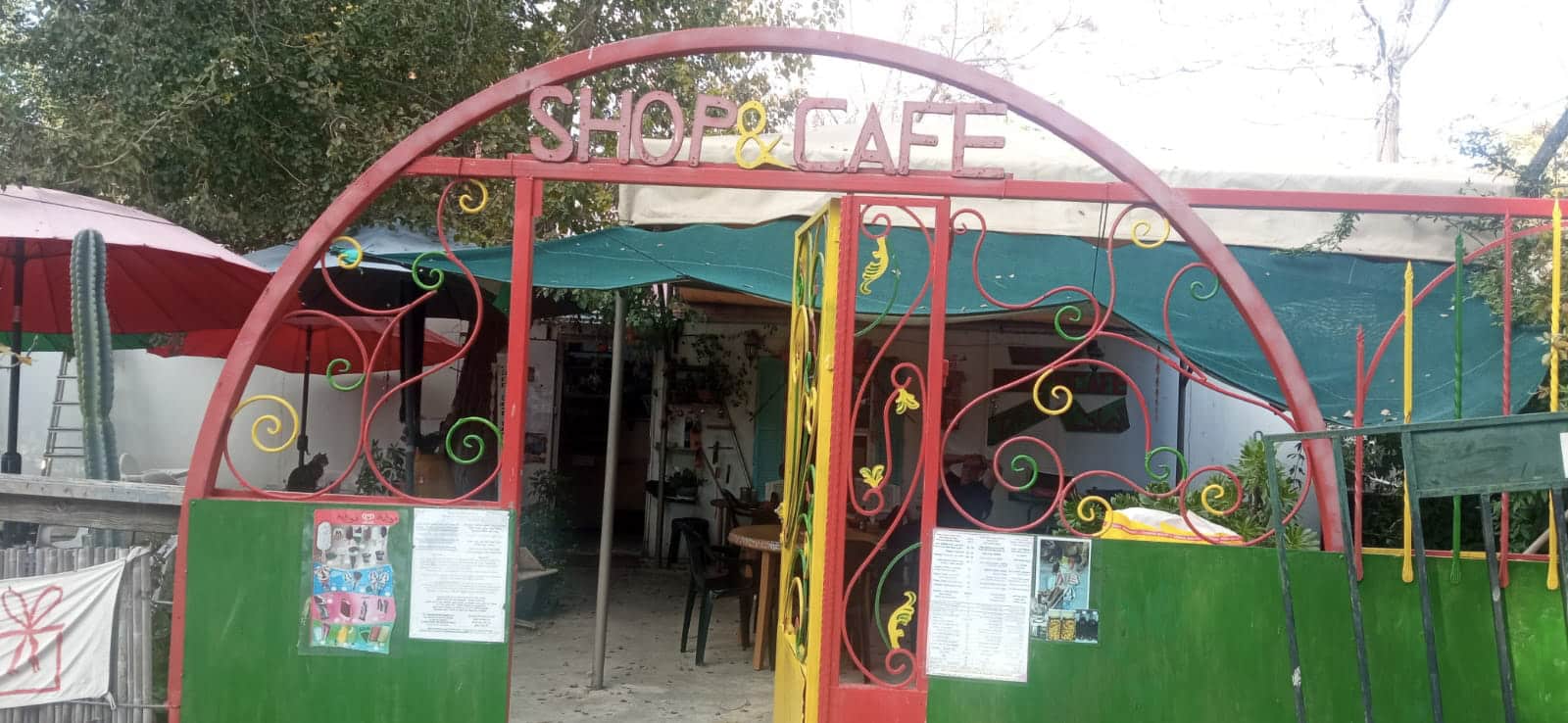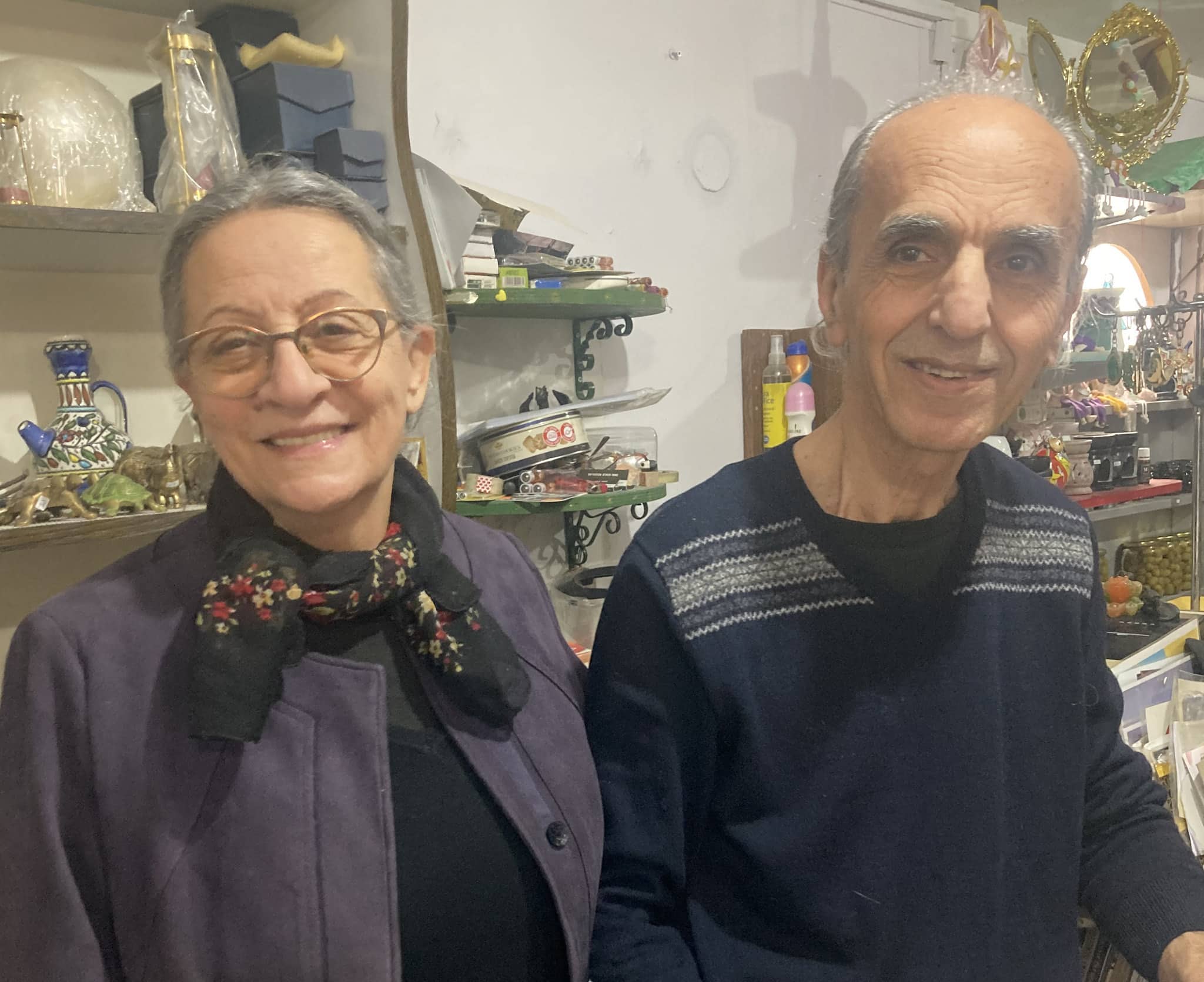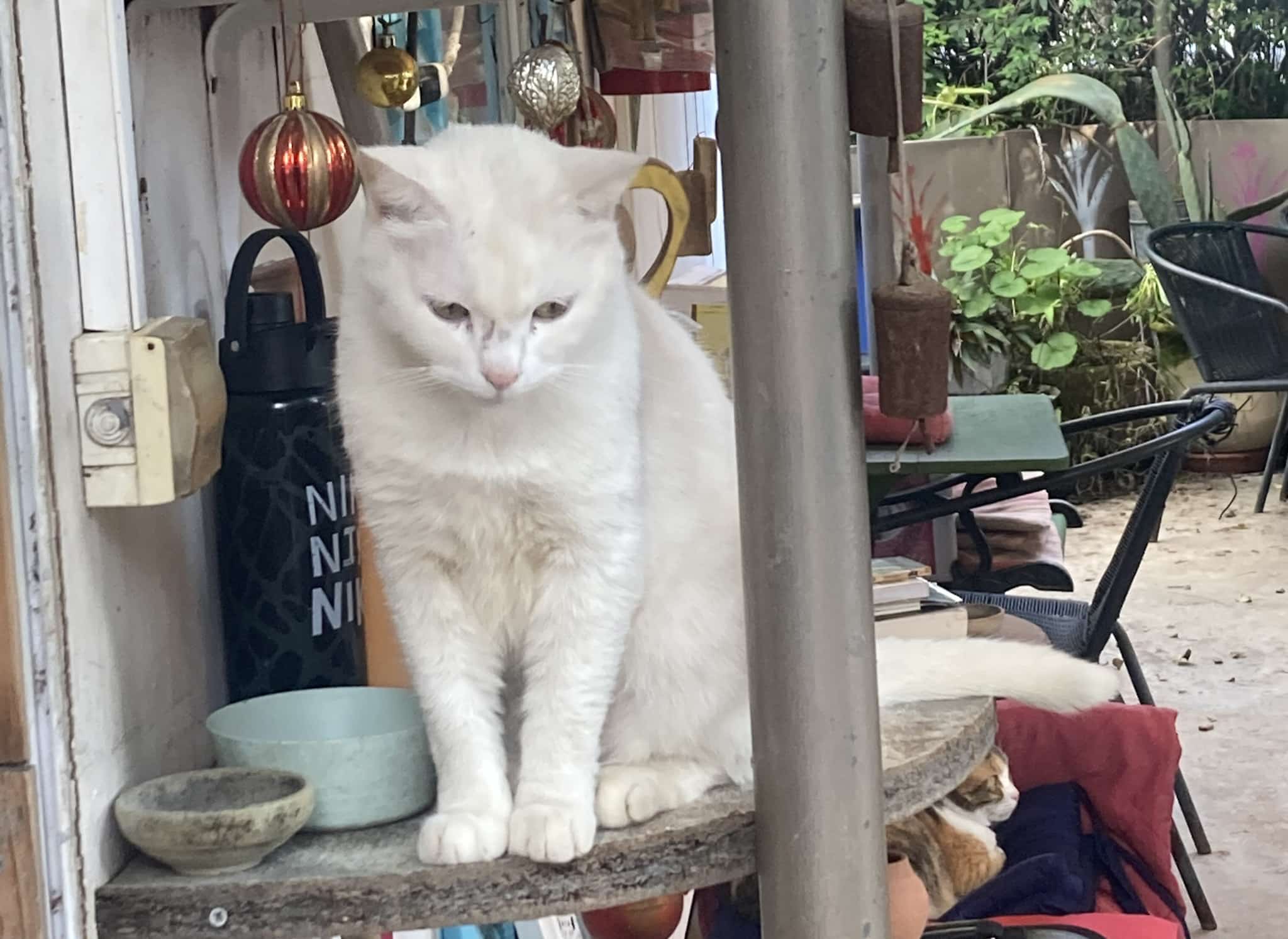Rayek is sitting in the shade at the cafe with his neighbours. Beside him a tortoiseshell cat curls snuggly…this is Honey. Rayek and Dyana are the cafe managers in the Palestinian-Israeli cooperative village of Wahat al-Salam/Neve Shalom. The cafe is a welcoming, colourful, and creative space where conversations flourish. Dyana tells me that Rayek’s name means ‘calm.’

Dyana first heard about Wahat as-Salãm / Neve Shalom in 1979. When she met Rayek in 1983, she brought him to visit. He was immediately captivated:
‘I was attracted to the place because it reminded me of my childhood summers in Mount Tabor. I knew I was destined to live there. I was drawn to the community because of its philosophy.’

Dyana (left), Rayek (right)
At that time, the prospect of remaining in Nazareth, where they were both born, was losing attraction; it had become crowded as a result of its need to expand vertically because the Israeli government had confiscated most of the surrounding lands after the Nakba of 1948. Rayek and Dyana, who are both Palestinian citizens of Israel, moved as newlyweds to Wahat as-Salãm / Neve Shalom in 1984.
‘Today, Palestinian citizens [of Israel] comprise 20% of the total population, numbering almost 1.2 million people. They remained in their homeland following the establishment of the State of Israel in 1948, becoming an involuntary minority.’
Wahat as-Salãm (Arabic) / Neve Shalom (Hebrew) is an intentional community, a village of Palestinian (both Christian and Muslim) and Jewish citizens of Israel dedicated to building justice, peace, and equality in the country and the region. The name translates to Oasis of Peace. It was founded in 1969 by Dominican priest Bruno Hussar, who converted from Judaism to Roman Catholicism. He envisaged a place where people could live a bi-national life of mutual respect.
Wahat al-Salam / Neve Shalom is equidistant from Jerusalem and Tel Aviv-Jaffa. The community was established on land made available by the nearby Cistercian Latrun Monastery. It is a model of equality, mutual respect, and partnership that challenges existing patterns of racism and discrimination and the continued conflict. The community has established educational institutions based on its ideals and conducts activities focused on social and political change. Many village members work on peace, justice, and reconciliation projects. It has a population of 70 families and hopes to grow to 150.
Since moving to Wahat as-Salãm / Neve Shalom, Dyana and Rayak’s life mission has been working to enhance the community they chose to join. Rayek has worked as a volunteer and member of staff in various roles: teacher, office manager, receptionist, night guard, tour guide, and elected secretary-general for the community.
When they chose to live in Wahat as-Salãm / Neve Shalom, Dyana had already been invited to join the School for Peace as a facilitator. The school was set up in 1980 to allow Palestinians and Israelis to ‘meet face to face, many for the first time in their lives.’ Dyana’s work meant that she became very involved in its vision.
Maintaining this vision has not always been an easy path- there have been many challenges, and at times, there have been significant breakdowns within the community. Despite this, the school continues to conduct courses for students from Israel and Palestine and to train facilitators in skills that support working together with acceptance of the other.
They also ask challenging questions about identity in Israeli society and the ongoing occupation of Palestine. Do national identities make up a big part of the problem? What courses of action would be best for reaching a humane solution to the Palestinian-Israeli conflict? In his book The Anteater and the Jaguar Rayek reflects,
‘I am not sure how these questions should be answered, but I believe that they are questions we must seriously consider.’

Dyana shared with us her commitment to education and creativity. She was very involved in setting up the school, a forerunner to the Hand in Hand school system of educating children from Israeli and Palestinian cultures together.
The school began in 1984. Each class has one Israeli and one Palestinian teacher. Children are taught in a bi-lingual, bi-national way, each allowing for the identity of the other to be respected so that pupils can choose friendship instead of fear. Dyana explained that the school vision emphasises the creative alongside the academic, not as an add-on. More concentrated academia comes later after the foundation of mutual respect for each culture has been allowed to flourish.
Dyana has continued to express her love of creativity and its role in sharing lives by establishing the Oasis Art Gallery, a space for artists of Israeli and Palestinian cultures. When the war began, she had been about to launch a new exhibition. The launch did not take place because of the prevailing circumstances.
‘Suddenly, a drastic event befell us – a huge one out of the series of them in the political conflict we are a part of. That event has only intensified and still has not enabled us to return [to life as before]…It has been extremely tough opening up the conversation with artists about sharing the same space again.’
Now Dyana’s hope is to have an exhibition and work with artists who see a future for shared spaces in creativity and beyond.
‘A few months have passed since that day, but it feels like a long year, and I, like everyone else, am still shocked by what happened and is happening. Lots of crying, questions, and concerns. Death and destruction encroach and I try to take care of myself, my house and family, the village, and, of course, the gallery.’
When the Israel-Gaza war began on 7 October, Rayek did not open the cafe. Dyana shared;
‘There was no point, no one was coming. Then, one day, Rayek decided to open the cafe again, and very slowly, a few were returning. The conversations are beginning again.’
Dialogue sessions for the inhabitants have been held with facilitators from the peace school in Wahat al-Salam / Neve Shalom.
By moving to Wahat al-Salam / Neve Shalom. Rayek and Dyana have committed their lives to working steadfastly for the vision of Father Bruno and the possibility of an oasis of peace and living together within Israeli society where Palestinian Israeli citizens can participate with mutual respect.
Take action!
-
The humanitarian consequences of the Israel-Gaza war are catastrophic. There is no time to lose – please support our urgent actions today.
-
Learn more about the two-tier system which governs Israelis and Palestinians living within Israel in this report from human rights organisation, Adalah.
-
See our list of Palestinian and Israeli peace and human rights organisations, who are facing increasing repression from the Israeli government. Follow and support their work.


